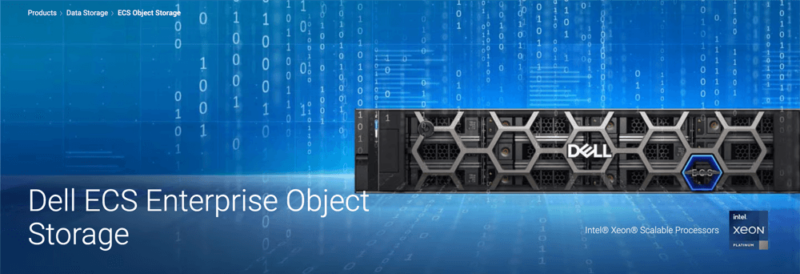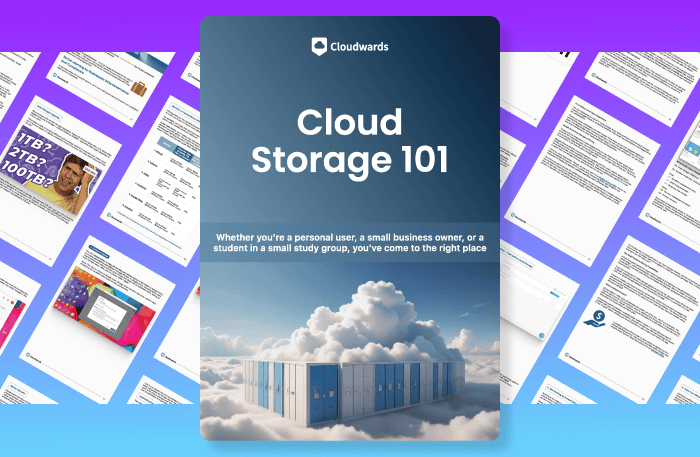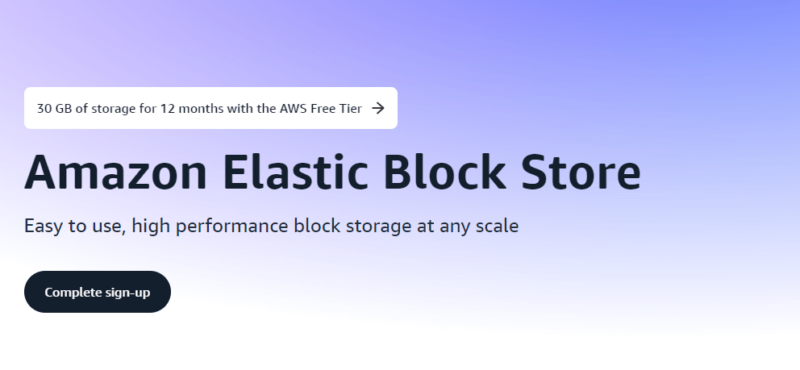What Is Elastic Cloud Storage? Examples, Features and Pricing in 2025
Elastic cloud storage (ECS) is a cloud storage solution that uses object storage and lets businesses adjust the amount of storage they use based on current needs. As you’ll see below, ECS eliminates the common problem of running out of storage space.
The best cloud storage services fill a variety of needs for businesses. They provide features to store and share data, as well as tools that enhance productivity and enable collaboration. However, growing businesses can run into issues regarding how much storage capacity they need. Elastic cloud storage (ECS) is one option that can be a great alternative for such cases.
ECS offers a way for businesses to grow or shrink their storage capacity based on their current needs. Additionally, ECS provides businesses with advanced tools like data lakes, or support for deployment and sustainment for the Internet of Things. Before we explore ECS, it’s important to know what the service is.
-
04/27/2024 Facts checked
Updated to include the latest ECS features and availability.
What Is Elastic Cloud Storage?
ECS is a type of cloud storage that can increase or decrease the overall capacity provided based on a business’s needs at a given moment. For example, if there is a massive but short-term project that requires more cloud storage than what’s currently available, ECS will increase the storage capacity temporarily to meet that project’s needs.

lets businesses scale their storage capacity.
Understanding the difference between ECS and traditional cloud storage is important. It’s reasonable to think that unlimited cloud storage plans work the same. However, the benefit of ECS is that the allotted storage amount isn’t static; it adjusts and scales as your business changes. ECS also provides services like data lakes that traditional cloud storage does not.
10,000+ Trust Our Free Cloud Storage Tips. Join Today!

- Demystify cloud storage terminology and key concepts in plain language
- Discover easy-to-implement techniques to securely backup and sync your data across devices
- Learn money-saving strategies to optimize your cloud storage costs and usage
Flexibility and Scalability
Flexibility and scalability are the two primary benefits of using ECS. As a business, you aren’t locked into a predetermined amount of storage. If you need to expand your cloud storage space, ECS lets you do so. Conversely, you can lower your storage amount if you need to reduce the overall capacity.
Elastic Cloud Computing
The concept of elasticity is more than just adding or removing storage capacity when the need arises. In cloud computing, elasticity also includes the system and infrastructure’s ability to rapidly and efficiently manage changing needs and demands. For more, check out our cloud computing articles.
How ECS Works
ECS enables organizations to quickly scale their storage capacity, either by increasing or decreasing it. Businesses with predictable increases in storage demand can configure their ECS to scale up and down automatically. Amazon S3 is a prime example of this feature. Otherwise, scaling can be done manually by contacting the ECS provider when needed.
Having the option to scale on demand makes it so organizations don’t have to invest in cloud storage that they aren’t actively using. It also lets them respond almost immediately to a sudden increase without wasting time setting up or changing their cloud storage plan. If businesses typically use on-site storage, they can also use ECS to quickly scale beyond normal capacity.
There are a few other unique aspects of ECS. However, first we need to identify the most prominent providers of this service. Dell offers an ECS service, as do Amazon, Google and Microsoft Azure.
Elastic Cloud Storage Providers
Dell Technologies offers ECS as a solution for handling large data volumes from different sources, such as mobile devices or the Internet of Things. In addition to storing huge sets of data, Dell ECS provides analytical tools to help businesses make sense of collected data.
Amazon S3 is another provider of elastic cloud storage and computing. It scales according to your needs and charges only for what you use. Google Elastic is another provider offering similar services. Like Amazon and Dell, it grows and shrinks based on your needs and demands.

and Google Cloud — offer an elastic storage service.
Data Storage
While most traditional cloud storage services are capped at several terabytes of storage, an ECS rack can have many petabytes (PB) — which is 1,000 terabytes — of storage capacity. Additionally, an ECS can scale the amount of PBs you have by using stacks or clusters. This flexibility is possible partly because an ECS uses object storage architecture.
Object Storage
Object storage architecture manages data as objects, whereas traditional cloud storage services manage data as files. For cloud storage that holds lots of data and needs to scale easily, object storage is a better method. Object storage uses data, metadata and a unique global identifier to store, sort and retrieve data.
Benefits of ECS
Using an elastic cloud storage solution has several benefits that make it a good option for businesses to consider.
- Elasticity: A business can increase or decrease its overall storage capacity with little to no downtime.
- Scalability: Businesses can scale their cloud needs to meet growing workload demands.
- Lower total cost of ownership (TCO): The overall TCO of an ECS is lower when compared to traditional or public cloud storage. This is partly due to reduced overhead and a data center with a smaller footprint.
- Data encryption: With an ECS, data has encryption while at rest and in transit. Businesses also manage encryption keys, giving the ECS zero-knowledge encryption.
- Consolidation: ECS offers a way to consolidate multiple storage systems, simplifying the management and administration of cloud services.
ECS Examples and Use Cases
Businesses can use elastic cloud storage for traditional functions, such as file sharing and collaboration, while also taking advantage of these possible use cases:
- Data lakes: An ECS can establish an on-premises data lake that businesses can use for advanced analytics on structured or unstructured data.
- Archival data: With an ECS, businesses can create a secondary storage as a useful location to store older projects or archival data without having to send the data off-site.
- Internet of Things: Businesses that develop and deploy Internet of Things devices and applications can use ECS to store related data with no limits.
- Application development: The design, development, deployment and sustainment of applications all receive support through ECS storage and architecture.
Elastic Cloud Storage and Data Security
ECS has several inbuilt security and privacy measures, as we touched on briefly in the “benefits of ECS” section above. Data at rest is protected by server-side AES 256-bit encryption. When businesses transfer or transmit data, it’s protected using TLS/SSL encryption protocols.
Encryption key management resides with the business, effectively making the ECS zero-knowledge encrypted. If you need cloud storage with private encryption, check out the best zero-knowledge cloud services.
Key management is either native or external. With native key management, keys are managed within the ECS. External keys are managed outside the ECS. Businesses maintain key control using either key management approach.
ECS Pricing
Dell ECS only charges businesses for the storage space they use, making the price vary for each customer. Additionally, since the service is flexible and customized for every business, Dell does not list the price per storage. The best way to see how much ECS would cost is by requesting a quote from Dell.
Amazon AWS and Google both charge by the amount of cloud computing you use, which is measured in elastic consumption or billing units. The cost is $0.0001 for Google and $0.001 for Amazon. Both employ a pay-as-you-use model.
Microsoft Azure offers a little more granularity when it comes to elastic pricing. It also uses a pay-as-you-use pricing model, and it charges $0.091GB per month. For Microsoft, Amazon and Google, you can see a more detailed breakdown of the costs in your respective account.
Final Thoughts
The Dell ECS solution is a good option for businesses needing adjustable cloud storage that tailors capacity based on current needs. It’s not the best cloud storage solution for every business. However, elastic cloud storage is a great choice for larger-sized businesses that need scalability and flexibility with powerful data management.
What is your current cloud storage solution? Would you consider elastic cloud storage for your business’s cloud storage needs? Let us know in the comments section below. Thanks for reading our article.
FAQ: What Is ECS?
Elastic cloud storage means that you aren’t locked into a set amount of storage space. You can increase or decrease the overall capacity based on your current needs.
Elastic cloud — which is different from ECS — is a service that lets businesses use cloud computing with variable services that change depending on their needs.
Elastic data storage is a way for businesses to scale their storage capacity to meet current needs or demands.
The benefits of elastic storage come from the ability to scale the overall storage capacity by increasing or decreasing it based on present needs or demands.


